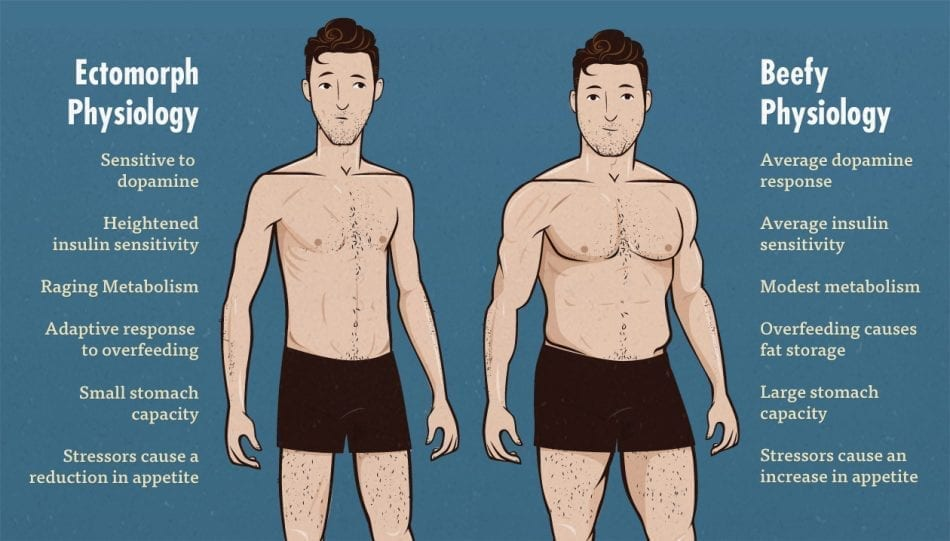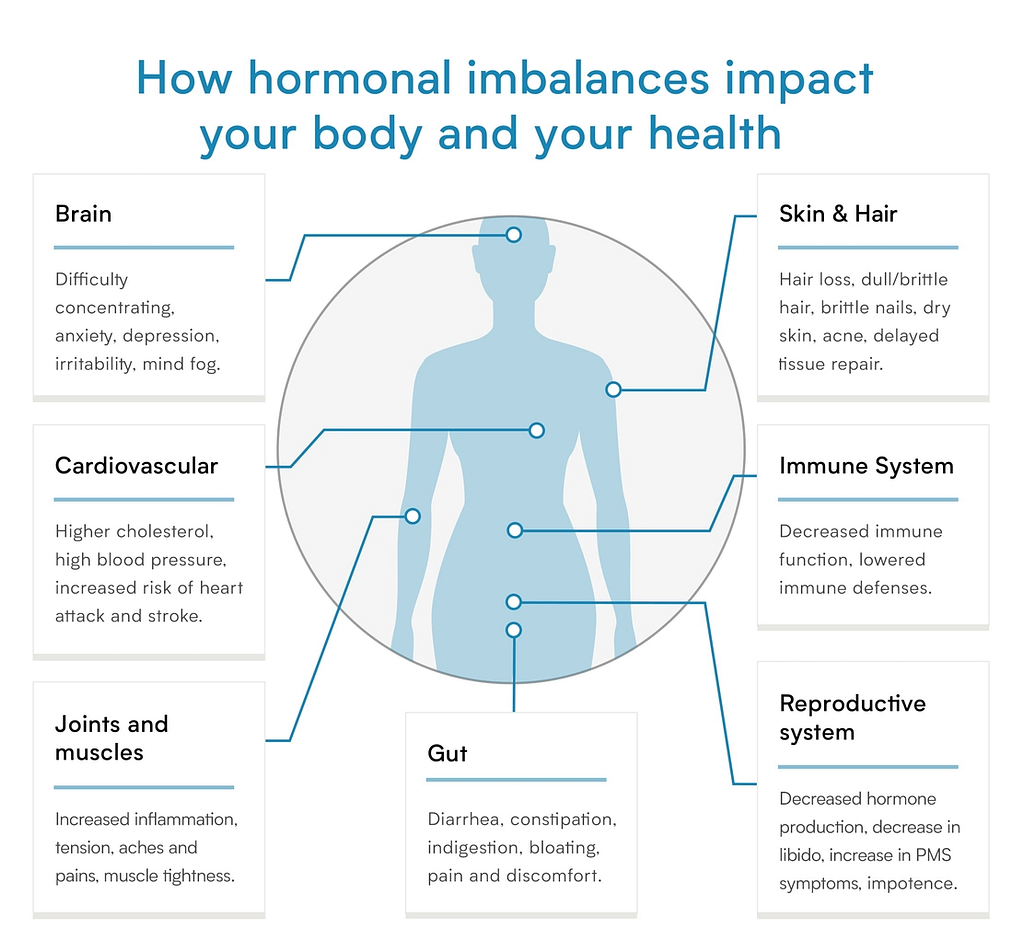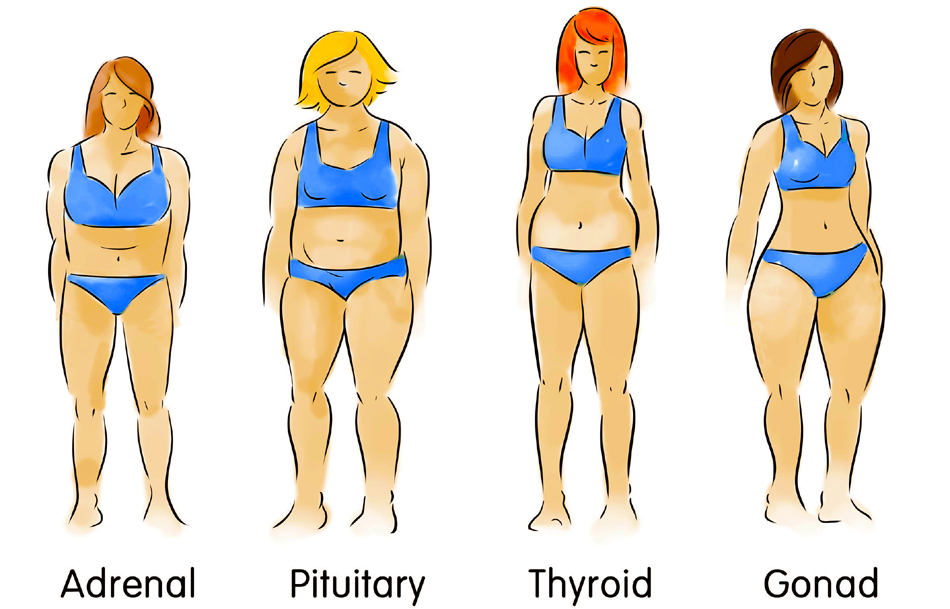In recent years, the concept of hormone types has gained attention as a way to better understand one’s body and improve overall health. Hormones play a significant role in a variety of bodily functions, including metabolism, growth, mood regulation, and reproduction. By identifying your hormone type, you can tailor your diet and lifestyle choices to better support your unique hormonal balance.

Hormone type quizzes, such as the Hormonal Imbalance Quiz from Women’s Health Network or the Metabolic Renewal Quiz, have emerged as helpful tools to guide individuals in determining their specific hormone profile. These quizzes often consist of a series of questions related to common hormonal imbalances, symptoms, and lifestyle factors.
Once you’ve determined your hormone type, you can use this information to make informed choices about your diet, exercise, and overall wellness strategy. By doing so, you are better equipped to achieve optimal health and balance in your life, taking into account the unique role hormones play in shaping your well-being.
Hormone Types
Hormone types play a significant role in understanding and managing hormonal imbalances. Each individual has a unique hormone type, which is influenced by various factors such as genetics, lifestyle, and health conditions. Knowing one’s hormone type can help address and alleviate symptoms related to hormone imbalances.
Among the various hormone types, estrogen dominance is quite common, particularly in women. This condition occurs when there is an excess of estrogen in the body, leading to symptoms such as weight gain, mood swings, and heavy periods. Addressing estrogen dominance may involve dietary changes, supplementation, and lifestyle modifications to help restore hormonal balance.
On the other hand, some individuals may have a progesterone deficient hormone type. Low progesterone levels can cause symptoms such as irregular menstrual cycles, anxiety, and difficulty sleeping. Identifying and addressing progesterone deficiency may involve hormone therapy, exercise, and stress management techniques.
Thyroid hormones are crucial in regulating metabolism, energy production, and overall health. Imbalances in thyroid hormones, either hyperthyroidism or hypothyroidism, can result in a wide range of symptoms, from weight changes to fatigue and depression. Understanding one’s thyroid hormone type is essential in effectively managing thyroid-related health issues.
There are hormone type quizzes available online, such as the ones found on healthcoachFX and Women’s Health Network that can help individuals identify their hormone type. These tools can guide individuals in taking steps toward achieving optimal hormonal balance and overall wellness.
In summary, understanding one’s unique hormone type, be it estrogen dominance, progesterone deficient, or related to thyroid hormones, is essential in addressing hormonal imbalances effectively. Knowledge about one’s hormone type can lead to better management of symptoms and improved overall health.

Understanding Hormonal Imbalance
Hormonal imbalance occurs when there are irregularities in the levels of hormones in the body, which may lead to various symptoms and health issues. Hormones are chemical messengers that control many vital functions in the body from metabolism and growth to reproduction and mood regulation. Maintaining balanced hormones is essential for overall hormonal health and well-being.
There are many factors that can contribute to hormonal imbalance, such as stress, poor diet, lack of sleep, and exposure to environmental toxins. Moreover, the levels of hormones can naturally fluctuate during different stages of life, such as puberty, pregnancy, and menopause. This makes it important to be aware of your hormone type to effectively manage your hormonal health.
Taking a hormone type quiz can help you identify whether you are experiencing hormonal imbalances and provide insights into the most suitable course of action. Some common symptoms of hormonal imbalances include fatigue, mood swings, weight gain, and digestive issues.
To promote balanced hormones, adopting a healthy lifestyle is crucial. This includes a well-balanced diet, regular exercise, stress management, and getting adequate sleep. Additionally, consulting a healthcare professional, such as a naturopathic medical doctor, can further assist in identifying the root causes of hormonal imbalance and guide you toward the appropriate treatment plan.
In conclusion, understanding hormonal imbalances and their causes can help you make informed decisions about managing your hormonal health. By identifying your hormone type and implementing strategies to achieve a balanced hormonal state, you can work toward improved overall health and well-being.

Physical Symptoms Of Hormonal Imbalance
Hormonal imbalances can manifest in various physical symptoms, affecting individuals differently. One common symptom is weight gain, which may be accompanied by fat gain in specific areas, such as love handles. This can be frustrating for many, as it often occurs despite maintaining a healthy lifestyle and exercise routine.
Hair loss is another noticeable sign of hormonal imbalance. Both men and women may experience thinning hair or even bald patches, which could indicate an underlying hormonal issue. Similarly, changes in skin condition, such as dry skin or acne, can be attributed to hormonal fluctuations, particularly during puberty, pregnancy, or menopause.
Individuals with hormonal imbalances often report muscle weakness and feeling lethargic. Daily tasks may seem more challenging, and physical strength might not be at its usual level. In some cases, people experience persistent fatigue and low energy levels, making it difficult to maintain their usual routine and impacting overall quality of life.
Conversely, some individuals may have excess energy, making it difficult for them to relax or sleep properly. Sleep disturbances can contribute to fatigue, as well as other symptoms, such as irritability, headaches, and difficulty concentrating.
Pain and discomfort are also common physical symptoms of hormonal imbalance. Individuals may experience headaches or bloating, and women may have more painful menstrual cramps. Hot flashes are a well-known symptom of menopause and can cause sudden warmth and sweating, impacting daily comfort and sleep.
By being aware of these physical symptoms, individuals can better understand the potential impacts of hormonal imbalances on their bodies. Promptly discussing these concerns with a healthcare professional can lead to appropriate diagnosis and treatment, ultimately improving overall well-being and daily functioning.

Emotional Effects of Hormonal Imbalance
Hormonal imbalances can have significant effects on an individual’s emotional well-being. One common symptom people experience is mood swings, where emotions can shift rapidly from one extreme to another. This turmoil can lead to feelings of irritability, making it difficult to maintain a sense of calm and stability in daily life.
In addition to mood swings, hormonal imbalances can cause heightened anxiety. This may manifest as periods of intense worry or fear, which can be debilitating and affect one’s daily functioning. Similarly, depression can also be a consequence of hormonal imbalances, leading to persistent feelings of sadness, hopelessness, and lack of motivation.
People experiencing hormonal imbalances might also find themselves dealing with mental fog and reduced cognitive clarity. This persistent foggy feeling can have consequences on overall mental function, impacting decision-making abilities, memory, and focus. The culmination of these emotional effects may lead to a significant reduction in motivation, making it challenging to accomplish daily tasks and pursue personal goals.
Cravings, often intense and frequent, are another emotional manifestation of hormonal imbalances. These cravings can lead to unhealthy eating patterns, promoting a cycle of emotional eating in response to feelings of stress, anxiety, or depression. This behavioral pattern may further exacerbate emotional distress, contributing to a vicious cycle that can be difficult to break.
In conclusion, hormonal imbalances can significantly impact emotional well-being, manifesting in mood swings, anxiety, depression, mental fog, and cravings. Recognizing these signs can be a crucial first step in seeking appropriate support and treatment to better manage these symptoms and improve overall mental health.

Hormonal Changes and Menopause
Menopause is a natural phase in a woman’s life, marking the end of her menstrual cycles and fertility. It usually occurs between the ages of 45 and 55. This process is the result of a gradual decline in hormone production, primarily estrogen and progesterone.
During the transition to menopause, called perimenopause, hormonal fluctuations may cause a variety of symptoms. These symptoms can include hot flashes, night sweats, sleep disturbances, mood changes, and irregular menstrual cycles. Perimenopause can last several years before a woman reaches menopause, during which time their hormone levels may continue to shift.
Hot flashes are a common symptom experienced by women during menopause. They are characterized by a sudden feeling of heat, usually in the upper body, followed by sweating and rapid heartbeat. Hot flashes can occur a few times a week or multiple times a day, and may significantly impact a woman’s quality of life.
In some cases, women may experience estrogen dominance during perimenopause. Estrogen dominance occurs when the levels of estrogen are higher in relation to progesterone. This hormonal imbalance can cause symptoms such as bloating, weight gain, irregular periods, and breast tenderness.
To gain more insight into possible hormonal imbalances, women can take a hormone type quiz or menopause quiz. These quizzes help individuals identify possible hormonal imbalances and understand how their symptoms relate to hormonal changes during menopause.
In conclusion, hormonal changes during menopause can significantly impact a woman’s well-being, leading to various symptoms and imbalances. Awareness of these changes, and understanding one’s hormone type, can be a helpful tool in managing menopause symptoms more effectively.

Hormonal Imbalance and Menstrual Cycle
Hormonal imbalances can significantly impact a woman’s menstrual cycle. The menstrual cycle is regulated by a complex interplay of hormones, including estrogen and progesterone. When these hormones are out of balance, it can lead to various issues related to periods and overall reproductive health.
Estrogen is the primary female hormone responsible for regulating the menstrual cycle. It promotes the growth of the uterine lining and prepares the body for potential pregnancy. Progesterone, on the other hand, is the hormone responsible for maintaining the uterine lining and supporting a healthy pregnancy. Together, they work in harmony to regulate the menstrual cycle.
Estrogen dominance is a condition where there is too much estrogen in the body relative to progesterone. This imbalance can lead to a host of issues, including irregular or heavy periods, mood swings, and even fertility problems. Common causes of estrogen dominance include stress, poor diet, and environmental factors such as exposure to endocrine-disrupting chemicals.
Hormone type quizzes can be useful in identifying hormonal imbalances and understanding one’s hormone profile. For instance, those experiencing symptoms like irregular periods, fatigue, or mood swings might want to take a hormonal imbalance quiz to determine if they may be dealing with an imbalance in estrogen or progesterone levels.
Furthermore, maintaining a healthy lifestyle can help to balance hormone levels and improve menstrual cycle regulation. Some ways to achieve this include managing stress, eating a balanced diet, getting regular exercise, and avoiding exposure to harmful chemicals. Additionally, seeking the advice of a healthcare professional can provide further guidance and appropriate assessment or treatment if needed.

Metabolic Renewal Program
The Metabolic Renewal Program is a personalized approach to weight loss and fitness tailored to women’s unique hormone types. This program uses a specialized Metabolic Renewal Hormone Type Quiz to determine each individual’s hormone type and create custom diet and exercise plans accordingly.
There are seven different hormone types identified in the program:
- Hormone Type 1: Mixed-Signal Metabolism
- Hormone Type 2: Hormone Overload Metabolism
- Hormone Type 3: Hormone Shortfall Metabolism
- Hormone Type 4: Ovarian Burnout Metabolism
- Hormone Type 5: Metabolic Sputter Metabolism
- Hormone Type 6: Ovarian Fatigue Metabolism
- Hormone Type 7: Ovarian Shutdown Metabolism
Understanding each individual’s unique metabolic profile allows for the creation of targeted plans that are intended to optimally support each woman’s specific needs. This approach is more effective than traditional one-size-fits-all diet and exercise programs.
To begin the program, individuals must first take the Metabolic Renewal Quiz, which is a short series of questions related to menstrual cycle, metabolism, age, and overall health. The results of this quiz will help in identifying the primary metabolic hormone type.
Once the hormone type is determined, the Metabolic Renewal Program provides tailored advice on diet and exercise, which are specifically designed to address the unique hormone-related challenges faced by each individual. The program also offers guidance on how to manage lifestyle factors such as stress and sleep, which can impact hormonal balance and overall well-being.
For example, individuals with a Metabolic Sputter hormone type may experience issues with energy levels and weight management. The program will provide recommendations for a balanced diet that supports stable energy levels, as well as exercises that are most effective in promoting weight loss and overall wellness for these individuals.
The Metabolic Renewal Program aims to empower women by providing knowledge on how hormone types impact metabolism and overall health. Through personalized diet and exercise plans, the program seeks to promote better health and well-being for women of all ages and hormonal profiles.

Impact of Diet and Lifestyle
Diet and exercise play a significant role in determining hormone levels, and making appropriate lifestyle choices can help find the right balance. Proper nutrition and consistent exercising support healthy hormone production, which impacts key aspects of daily life, such as stress levels and libido.
Choosing a balanced diet is crucial for promoting hormonal health. Consuming a variety of nutrient-dense foods, including vegetables, fruits, lean meats, and whole grains, can provide the essential vitamins and minerals for optimal hormone function. Furthermore, a balanced diet helps prevent excessive weight gain, which may negatively affect hormone production.
Regular exercise is another critical element for maintaining healthy hormone levels. Engaging in physical activity contributes to balanced hormone production and improved overall wellbeing. Strength training, aerobic activities, and flexibility exercises are all essential when incorporating an exercise program into your lifestyle.
Caffeine intake should be moderated as it can affect hormone balance. Consuming too much caffeine may cause imbalances in stress hormones, such as cortisol, potentially leading to increased stress levels and decreased libido. Limiting caffeinated beverages and opting for water, herbal tea, or decaffeinated coffee may contribute to better hormonal health.
Managing stress is necessary for preventing hormonal imbalances. Elevated stress levels can disrupt hormone production, leading to negative effects on overall wellbeing. Implementing stress reduction techniques, such as meditation, deep breathing exercises, or engaging in enjoyable hobbies, can support a healthy hormone balance.
In conclusion, a well-rounded diet and exercise program that includes managing caffeine intake and stress levels are essential components for promoting healthy hormone balance. Regularly evaluating your lifestyle choices and making adjustments as needed can improve overall health and wellbeing.

Diagnosing Hormonal Imbalance
Diagnosing hormonal imbalance involves understanding various symptoms and causes that may indicate an issue with hormone levels. To identify these imbalances, healthcare professionals often rely on a combination of medical history, examination, and diagnostic tests. One useful tool that can provide valuable insights into hormonal imbalances is the hormone type quiz.
A hormone type quiz is an online self-assessment designed to evaluate an individual’s hormonal health and pinpoint potential imbalances Example: The Hormonal Imbalance Quiz. These quizzes typically consist of multiple-choice questions related to symptoms, lifestyle, and personal health history. The results help users identify whether their hormone levels are likely to be contributing to their health issues.
While hormone quizzes can be a helpful starting point, it’s essential to consult with a qualified healthcare practitioner for a comprehensive evaluation and diagnosis. Medical professionals may use questionnaires like the Menopause Type® Questionnaire in combination with blood or saliva tests to assess hormone levels more accurately.
Some common causes of hormonal imbalances include hormonal therapies, medical conditions like type 1 and type 2 diabetes, thyroid disorders, and menopause. A medical professional will take these potential causes into account when making a diagnosis, ensuring that any treatment plan is customized to address the specific hormonal imbalance at hand.
In conclusion, while hormone type quizzes can provide valuable insights into an individual’s hormonal health, they should not replace the expertise and knowledge of a qualified healthcare practitioner. To obtain an accurate diagnosis and appropriate treatment for hormonal imbalances, it’s crucial to consult with a medical professional and undergo a comprehensive evaluation.

Addressing Hormonal Imbalance
Hormonal imbalances can impact various aspects of a person’s health and well-being, from mood swings to physical energy levels. One efficient way to address these imbalances is by focusing on nutrition and lifestyle choices that directly affect hormone production in the body.
A well-balanced diet can play a crucial role in promoting hormonal health. By incorporating a variety of nutrient-dense foods, such as fruits, vegetables, lean proteins, and healthy fats, individuals can support the proper functioning of their endocrine system. This approach allows for an adequate intake of essential vitamins, minerals, and antioxidants necessary for hormone synthesis.
For example, cortisol is a hormone that regulates stress response within the body. Optimal levels of cortisol help maintain balanced blood sugar and play a significant role in managing stress. To maintain healthy cortisol levels, individuals can avoid excessive consumption of processed foods, refined sugars, and caffeine, which are known to disrupt cortisol balance.
Additionally, including specific nutrition elements like omega-3 fatty acids, magnesium, and vitamin D in the diet can help support hormonal balance. Foods rich in these nutrients, such as fatty fish, leafy greens, and fortified dairy products, can help alleviate hormonal imbalances.
Regular physical activity is also essential in addressing hormonal imbalances. Exercise has been shown to help reduce cortisol levels and improve overall stress response. Incorporating activities such as yoga, meditation, or even a simple walk can go a long way in helping maintain hormonal equilibrium.
Another practical way to support hormonal balance is through the use of targeted and personalized hormone type quizzes, as found on healthcoachFX. These can help individuals identify potential hormonal imbalances and provide tailored recommendations for achieving better hormone balance.
Armed with this knowledge, individuals can also implement hormone-balancing recipes to ensure they are consuming the right mixture of nutrients and ingredients in a delicious and enjoyable manner. These recipes can be used as an essential tool for individuals looking to improve their dietary habits and achieve a healthier hormonal balance.

Other Hormonal Issues
Ovarian burnout is a condition that can cause hormonal imbalances, often leading to a variety of symptoms such as fatigue, mood swings, and changes in menstrual cycles. This condition can develop due to factors like chronic stress, poor diet, and insufficient sleep. It is essential to address the causes of ovarian burnout and support the endocrine system’s overall health.
A common hormonal issue is the imbalance in blood sugar levels, which can lead to insulin resistance, weight gain, and an increased risk of developing type 2 diabetes. Consuming excessive amounts of sugar can trigger fluctuations in hormone levels, impacting overall well-being. It is crucial to manage sugar intake and choose healthier carbohydrate options to maintain optimal hormone balance.
Food cravings often indicate a hormonal imbalance, especially when they involve sugary or high-fat foods. These cravings can be triggered by hormonal changes, including imbalances in serotonin or cortisol levels. It is essential to pay attention to food cravings, as they can provide valuable information about potential hormonal issues. Identifying the cause of these cravings can help individuals make healthier food choices that support hormonal balance.
Appetite is another factor affected by hormonal imbalances, leading to either overeating or undereating. Ghrelin, the “hunger hormone,” and leptin, the “satiety hormone,” play crucial roles in regulating appetite. Imbalances in these hormones can lead to unintentional weight gain or loss. Maintaining a healthy diet, regular exercise, and proper stress management strategies can help regulate appetite and support optimal hormone balance.
By addressing these hormonal issues, individuals can support overall endocrine system health and restore their hormonal balance. Focusing on healthy lifestyle choices, managing stress, and maintaining a balanced diet can significantly improve well-being.

Frequently Asked Questions
What tests can determine my hormone imbalance for weight loss?
There are various tests available to assess hormone imbalances that may affect weight loss, such as blood tests, saliva tests, and urine tests. A healthcare professional can recommend the appropriate test based on your individual needs and symptoms. They may also recommend additional tests to evaluate your overall health and underlying conditions that can contribute to hormonal imbalances.
How does hormone imbalance affect weight loss?
Hormone imbalances can have a significant impact on weight loss efforts. Hormones play a crucial role in regulating metabolism, appetite, and fat storage. When hormones are out of balance, it can slow down your metabolism, increase appetite, or lead to weight gain. Additionally, hormonal imbalances may contribute to cravings, emotional eating, and poor sleep quality, which can further hinder weight loss progress.
Can diet changes help balance hormones?
Yes, diet changes can play a significant role in balancing hormones and supporting weight loss efforts. Consuming a well-balanced diet rich in whole foods, such as fruits, vegetables, lean proteins, and healthy fats, can help to regulate hormone levels. Additionally, incorporating nutrient-dense foods with plenty of vitamins, minerals, and antioxidants can aid in hormone production and function.
What role does cortisol play in weight management?
Cortisol is a hormone released by the adrenal glands in response to stress. It helps the body manage stress by increasing blood sugar levels, suppressing the immune system, and breaking down muscle tissue for energy. However, consistently elevated cortisol levels can lead to weight gain, particularly in the abdominal area, as the hormone promotes fat storage. Learning how to manage stress through activities like exercise, meditation, and mindfulness can help reduce cortisol levels and support healthy weight management.
Are there specific hormonal types for women?
Yes, women can have differing hormonal profiles that may influence their weight and overall health. For example, some women may experience hormonal fluctuations during their menstrual cycle that can affect their mood, appetite, and energy levels. Hormone types can also change with age, especially during menopause, when estrogen and progesterone levels decline. Understanding your unique hormone profile through tests or quizzes, such as the Metabolic Renewal Quiz, can help you tailor your weight-loss strategies and lifestyle changes accordingly.
How can understanding hormone types improve weight loss results?
Gaining an understanding of your hormone types can help you implement targeted weight loss strategies that work with your body’s unique hormonal profile. By addressing hormonal imbalances, it becomes easier to achieve and maintain a healthy weight. By incorporating customized diet and exercise plans, managing stress, and considering supplementation under the guidance of a healthcare professional, one can optimize their hormonal balance to promote more effective weight loss results.
- Why is My Poop Black: Uncovering the Causes and Solutions - December 21, 2023
- Clear Protein Drinks: Optimal Hydration and Muscle Support for Athletes and Fitness Enthusiasts - December 21, 2023
- Does Apple Juice Make You Poop: Uncovering the Digestive Effects - November 29, 2023








